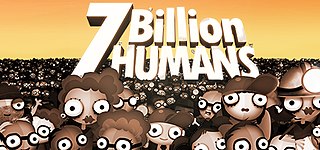 W
W7 Billion Humans is a puzzle video game developed by American studio Tomorrow Corporation, released on August 23, 2018 for Microsoft Windows, macOS, Linux, and the Nintendo Switch on October 25, 2018. Designed as a sequel to Human Resource Machine, players solve puzzles through by moving multiple data cubes with human workers, using an in-game programming language.
 W
WCarnage Heart is a video game for the PlayStation, developed by Artdink. Its gameplay is a mecha-based, turn-based strategy game, where the player takes the role of a commander in a war fought by robots. The robots, called Overkill Engines (OKEs), cannot be directly controlled in battle; they must be programmed beforehand to behave in a certain way under certain conditions using a flow diagram system.
 W
WChipWits is a 1984 robot simulation game for the Apple Macintosh, written by Doug Sharp and Mike Johnston, and published by BrainPower software. It was ported to the Apple II and Commodore 64.
 W
WCode.org is a non-profit organization and eponymous website led by Hadi and Ali Partovi that aims to encourage people, particularly school students in the United States, to learn computer science. The website includes free coding lessons and the initiative also targets schools in an attempt to encourage them to include more computer science classes in the curriculum. On December 9, 2013, they launched the Hour of Code nationwide to promote computer science during Computer Science Education Week through December 15, 2013.
 W
WColobot is an educational real-time strategy video game featuring 3D graphics, created by Swiss developer Epsitec SA. The objective of the game is to find a planet for colonization by the human race by establishing a basic infrastructure on the surface and eliminating any alien life forms endangering the expedition. The game takes place on the Earth, Moon, and seven fictional planets. The main feature of the game, which makes it educational, is the possibility for players to program their robots using a programming language similar to C++ or Java.
 W
WCore War is a 1984 programming game created by D. G. Jones and A. K. Dewdney in which two or more battle programs compete for control of a virtual computer. These battle programs are written in an abstract assembly language called Redcode.
 W
WDarwin was a programming game invented in August 1961 by Victor A. Vyssotsky, Robert Morris Sr., and M. Douglas McIlroy. The game was developed at Bell Labs, and played on an IBM 7090 mainframe there. The game was only played for a few weeks before Morris developed an "ultimate" program that eventually brought the game to an end, as no-one managed to produce anything that could defeat it.
 W
WDreams is a game creation system developed by Media Molecule and published by Sony Interactive Entertainment for the PlayStation 4, which released on 14 February 2020. It includes Art's Dream, a game developed in Dreams by said company, with access to other games and user-generated content. Players can create user-generated content in the form of fully-fledged games, mechanics, assets, sculptures, music, and art, which can be shared or remixed to be used in others' creations. Other players can indulge in such unique user-generated content.
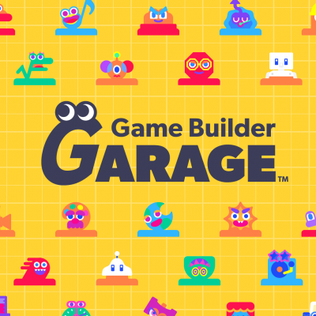 W
WGame Builder Garage is a programming game developed and published by Nintendo for the Nintendo Switch. It was announced on May 5, 2021, and released on June 11, 2021.
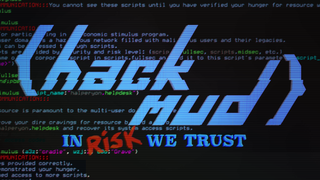 W
WHackmud is a massively multiplayer online video game and/or MUD that simulates 1990s hacker subculture through text-based adventure. Players use social engineering, scripting, and cracks in a text-based terminal to influence and control other players in the simulation. Reviewers wrote that the game's "campy hacking" mimics that of films like WarGames (1983) and Jurassic Park (1993).
 W
WHuman Resource Machine is a visual programming-based puzzle video game developed by Tomorrow Corporation. The game was released for Microsoft Windows, OS X and Wii U in October 2015, being additionally released for Linux in March 2016, for iOS in June 2016, for Android in December 2016 and for the Nintendo Switch in March 2017. Human Resource Machine uses the concept of a corporate office worker assigned to perform tasks that involve moving objects between an inbox, an outbox, and to and from storage areas as a metaphor for assembly language concepts. The player works through some forty puzzles in constructing a program to complete a specific task.
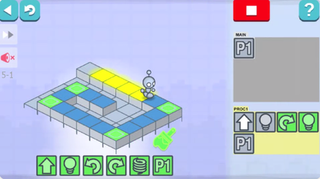 W
WLightbot is an educational video game for learning software programming concepts, developed by Danny Yaroslavski. Lightbot has been played 7 million times, and is highly rated on iTunes and Google Play store. Lightbot is available as an online Flash game, and an application for Android and iOS mobile phones. Lightbot has been built with Flash and OpenFL.
 W
WMind Rover is a video game for PC, developed by CogniToy.
 W
WOmega is a video game developed and published by Origin Systems in 1989. It was directed by Stuart B. Marks.
 W
WOpus Magnum is a puzzle-based programming game developed by Zachtronics. It was released for Microsoft Windows, Linux and macOS in December 2017, following about two months of early access. In the game, the player must assemble a machine using various tools and program those tools to complete alchemy-related tasks. The player can produce any working solution to each problem, but is challenged through leaderboards to produce a machine that does the task in the shortest time, with the lowest cost of materials, and/or the smallest occupied area. It was based on The Codex of Alchemical Engineering, one of the earliest Flash games made by Zach Barth prior to establishing Zachtronics.
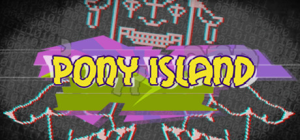 W
WPony Island is a video game developed and published by Canadian indie developer Daniel Mullins. As a metafictional game, the game has the player interact with what appears to be an old arcade cabinet game called "Pony Island". The player soon discovers the game is corrupted by Lucifer himself, who is trying to claim the player's soul for itself. The player is aided by the soul of a previous player who helps the player access Pony Island's internal programming to get around the traps left by Lucifer and save not only their soul, but the many tormented souls that are trapped within the game's code.
 W
WRARS is an acronym for Robot Auto Racing Simulator. It is an open source 3D racing simulator. RARS is designed to enabled pre-programmed AI drivers to race against one another. RARS was used as the base for TORCS. It was used as an example in the book Intelligent Information Processing and Web Mining by Mieczysław Kłopotek.
 W
WRoboforge is a strategy game developed by Liquid Edge and released in 2001.
 W
WRobot Battle is a programming game for Microsoft Windows where players design and code adaptable battling robots. Robot Battle takes strategy rather than reflexes, accuracy, or timing to succeed. What differentiates one robot from the next is its programming, for which the player is responsible. The game is inspired by the similar game RobotWar.
 W
WRobot Battle is a programming game developed in 1991 by Blue Cow Software for the Apple Macintosh where players design and code adaptable battling robots. Its idea is similar to RobotWar. The concept of the game was invented by Toby Smith in a BASIC program "when people with 512K of RAM and two floppy drives were power-users", as he states in the game manual.
 W
WRobot Odyssey was an adventure game published by The Learning Company in 1984 and released for the Apple II, TRS-80 Color Computer, and DOS. Most players have found it incredibly challenging. The player is readying for bed when, suddenly, they fall through the floor into an underground city of robots, Robotropolis. The player begins in the sewers of the city with three programmable robots, and must make their way to the top of the city to try to find their way home again.
 W
WRobotWar is a programming game written by Silas Warner. This game, along with the companion program RobotWrite, was originally developed in the TUTOR programming language on the PLATO system in the 1970s. Later the game was commercialized and adapted for the Apple II family of computers and published by Muse Software in 1981. The premise is that in the distant future of 2002, war was declared hazardous to human health, and now countries settled their differences in a battle arena full of combat robots. As the manual states, "The task set before you is: to program a robot, that no other robot can destroy!"
 W
WSpaceChem is an indie puzzle game developed by Zachtronics Industries, based on principles of automation and chemical bonding. In the game, the player is tasked to produce one or more specific chemical molecules via an assembly line by programming two remote manipulators that interact with atoms and molecules through a visual programming language. SpaceChem was the developer's first foray into a commercial title after a number of free Flash-based browser games that feature similar puzzle-based assembly problems.
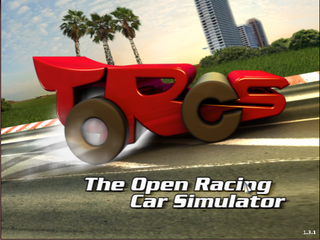 W
WTORCS is an open-source 3D car racing simulator available on Linux, FreeBSD, Mac OS X, AmigaOS 4, AROS, MorphOS and Microsoft Windows. TORCS was created by Eric Espié and Christophe Guionneau, but project development is now headed by Bernhard Wymann. It is written in C++ and is licensed under the GNU GPL. TORCS is designed to enable pre-programmed AI drivers to race against one another, while allowing the user to control a vehicle using either a keyboard, mouse, or wheel input.